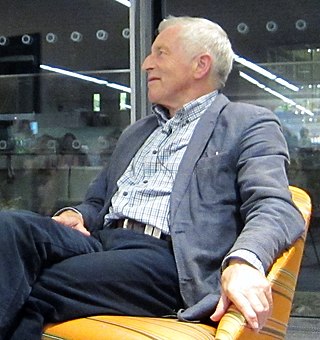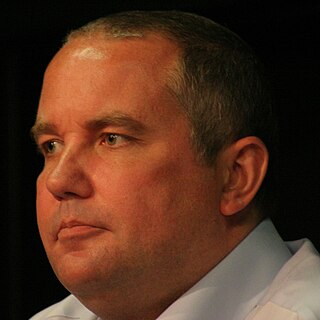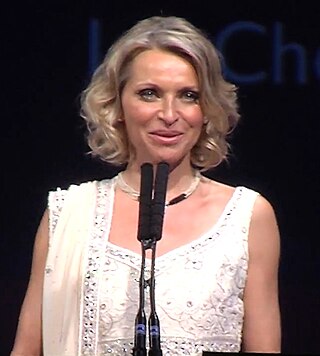
BBC Radio 3 is a British national radio station owned and operated by the BBC. It replaced the BBC Third Programme in 1967 and broadcasts classical music and opera, with jazz, world music, drama, culture and the arts also featuring. The station has described itself as "the world's most significant commissioner of new music".
Twenty questions is a spoken parlor game which encourages deductive reasoning and creativity. It originated in the United States and was played widely in the 19th century. It escalated in popularity during the late 1940s, when it became the format for a successful weekly radio quiz program.

Desmond John Humphrys is a Welsh broadcaster. From 1981 to 1987 he was the main presenter of the Nine O'Clock News, the flagship BBC News television programme, and from 1987 until 2019 he presented on the BBC Radio 4 breakfast programme Today. He was the host of the BBC Two television quiz show Mastermind from 2003 to 2021, for a total of 735 episodes. Humphrys now presents a regular Sunday afternoon show on Classic FM, where he also sometimes fills in on the weekday More Music Breakfast show.

David Dimbleby is an English journalist and former presenter of current affairs and political programmes, best known for having presented the BBC topical debate programme Question Time. He is the son of broadcaster Richard Dimbleby and elder brother of Jonathan Dimbleby, of the Dimbleby family. Long involved in the coverage of national events, Dimbleby hosted the BBC Election Night coverage from 1979 to 2017, as well as United States presidential elections on the BBC until 2016. He has also presented and narrated documentary series on architecture and history.

Frederick Richard Dimbleby was an English journalist and broadcaster, who became the BBC's first war correspondent, and then its leading TV news commentator.

Jonathan Dimbleby is a British presenter of current affairs and political radio and television programmes, author and historian. He is the son of Richard Dimbleby and younger brother of television presenter David Dimbleby.

Question Time is a topical debate programme, typically broadcast on BBC One at 10:45 pm on Thursdays. It is usually repeated on BBC Two and on BBC Parliament later in the week. If there is a Leaders special, it would be broadcast simultaneously on BBC News. Question Time is also available on BBC iPlayer. Fiona Bruce currently chairs the show having succeeded David Dimbleby as presenter in January 2019.

BBC Radio Wales is a Welsh national radio station owned and operated by BBC Cymru Wales, a division of the BBC. It began broadcasting on 13 November 1978, replacing the Welsh opt-out service of BBC Radio 4.

Eddie Mair is a Scottish former broadcaster who was a presenter on BBC radio and television. He also presented a programme on LBC between 4pm and 6pm every weekday until his last sgow, on 18 August 2022, after which he retired from broadcasting. He also hosted BBC Radio 4's daily news magazine PM, the Radio 4 Saturday iPM, and NewsPod. He occasionally presented Newsnight and Any Questions. Mair became a stand-in presenter for The Andrew Marr Show following Marr's stroke. Mair left the BBC in August 2018.

Any Questions? is a British topical discussion programme "in which a panel of personalities from the worlds of politics, media, and elsewhere are posed questions by the audience".
Scott Mills was a British radio show broadcast on BBC Radio 1 from 2004 to 2022. It was hosted by Scott Mills, with contributions from Chris Stark. Other contributors have included Mark Chapman, Laura Sayers, and Beccy Huxtable, the last of whom left the show in 2013.

The Naked Scientists is a one-hour audience-interactive science radio talk show broadcast live by the BBC nationally on BBC Radio 5 Live, and internationally on ABC Radio National, Australia; it is also distributed globally as a podcast.

Fighting Talk is a topical sports show broadcast on BBC Radio 5 Live during the English football season. The show is broadcast on Saturday mornings for an hour between 1100 and 1200 and is currently presented by Rick Edwards. This show is a similar format to the ESPN show Around the Horn.

Saturday Live is a BBC Radio 4 magazine programme, first broadcast on 16 September 2006. It combines contributions from studio guests with real-life stories and short features, as well as the musical segment known as "Inheritance Tracks", in which famous people share memories about two music tracks, one that they consider they inherited from a previous generation and one they would recommend to future generations. Since 2013, following the example of a particular listener experience that resonated with the audience, it has featured a segment called "Thank You", consisting of voice messages from listeners who received acts of kindness from those strangers who were not, or could not be, thanked properly at the time. These messages sometimes refer to accidents, or amusing incidents, that happened decades earlier, and occasionally the kind stranger is found, and their response is then also shared.
Money Box is a weekly personal finance radio programme on BBC Radio 4, produced by BBC News, currently presented by Paul Lewis. The programme is broadcast live each Saturday in the half-hour slot just after midday. It is repeated on Sunday evenings just after 9.00pm.

BBC Radio 2 is a British national radio station owned and operated by the BBC. It is the most popular station in the United Kingdom with over 14 million weekly listeners. Since launching in 1967, the station broadcasts a wide range of content. The 'About Radio 2' BBC webpage says: "With a repertoire covering more than 60 years, Radio 2 plays the widest selection of music on the radio - from classic and mainstream pop to country, folk, jazz, musical theatre, soul, hip hop, rock 'n' roll, gospel and blues."
A timeline of notable events relating to BBC Radio 2, a British national radio station which began broadcasting in September 1967.
A timeline of notable events relating to BBC Radio 4, a British national radio station which began broadcasting in September 1967.
This is a list of events taking place in 2019 relating to radio in the United Kingdom.
Since 1934, Bristol has been the home of radio programmes transmitted throughout the UK and the world via BBC World Service. The BBC Radio & Music Production unit operates separately from the BBC Radio Bristol, which serves listeners in and around the city. The network production team makes programs for the UK and a global audience. The genre focus in Bristol includes a wide range of topics, such as food and farming, environmental journalism, natural history, investigative documentaries, human interest, Bristol R&M Production readings, drama, poetry, conversation, and political debates. In 2017, the team in Bristol began producing podcasts for the BBC. It has been located in Broadcasting House, Bristol since 1934, which is also home to the BBC Natural History Unit, BBC West, and BBC Radio Bristol, in addition to BBC Network Radio Bristol.












